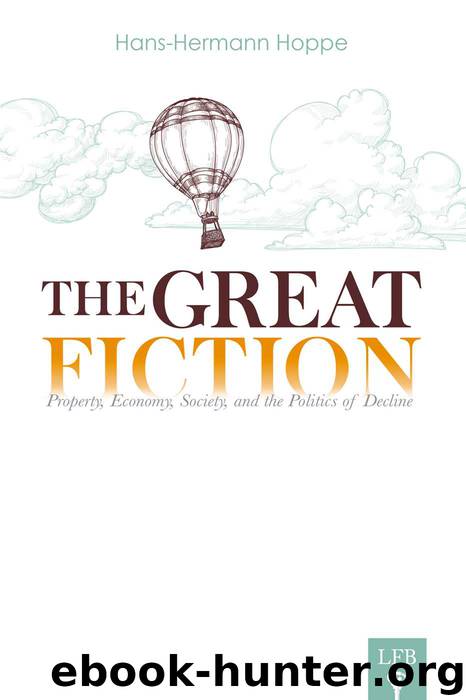The Great Fiction: Property, Economy, Society, and the Politics of Decline (LFB) by Hoppe Hans-Hermann

Author:Hoppe, Hans-Hermann [Hoppe, Hans-Hermann]
Language: eng
Format: epub
ISBN: 9781621290315
Publisher: Laissez Faire Books
Published: 2012-09-24T00:00:00+00:00
V.
Little of this ever attracts the attention of theoreticians of radical uncertainty. The existence of a practical working technology and of a vast and flourishing insurance industry constitutes an embarrassment for any theory of radical uncertainty. If pressed sufficiently hard, of course, Lachmann and his followers would probably admit the undeniable and, as if all of this did not matter, quickly move on to another problem. So far, it might be pointed out with some justification, attention has been directed almost exclusively either to the technological rather than the economic aspect of action—to accidents rather than to actions. The phenomenon of radical uncertainty, however, arises in a different arena. While it may be possible to predict the physical outcomes if such and such an action is taken, and while it may be possible also to predict the pattern of various physical events entirely outside of human control, matters are completely different when it comes to predicting our own future actions. I can predict that my toaster will toast if I employ it in a certain way, and I can predict that toasters generally do not work longer than 10 years, but presumably I cannot predict whether or not I will actually employ my toaster in the future, nor could I have predicted before it actually happened that I ever wanted—and constructed or bought—a toaster in the first place. It is here, in the arena of human choices and preferences, where supposedly radical uncertainty reigns.
Lachmann and his followers are correct in emphasizing that the problem of predicting my and others’ future actions is categorically different from that of predicting the physical outcomes of given actions or of natural events. In fact, the destructive part of Lachmann’s argument is largely correct even though it is hardly new (and entirely insufficient to establish his constructive thesis of radical uncertainty).6 This is the roof that not only the idea of perfect foresight, underlying general equilibrium theory, is mistaken, but likewise the idea, advanced by rational expectations theorists, that all human uncertainty can be subsumed under the heading of insurable risks: that the uncertainty concerning our future actions in particular is no different from that regarding the future of natural events, such that we can, based on our observation of long-run frequency distributions, predict their general pattern in the same way as we can predict the pattern of earthquakes, tornadoes, cancer, or car accidents, for example.
As Lachmann points out, and as Frank Knight and Ludwig von Mises explained long before, the new theory of rational expectations suffers from essentially the same deficiency as the old general equilibrium model of perfect foresight: it cannot account for the phenomenon of learning and, hence, of knowledge and consciousness. Rational expectation theorists only replace the model of man as a never-failing automaton with that of a machine subject to random errors and breakdowns of known types and characteristics. Rather than possessing perfect knowledge of all singular (individual) actions, man is assumed to possess merely perfect knowledge of the probability distribution of all future classes of actions.
Download
This site does not store any files on its server. We only index and link to content provided by other sites. Please contact the content providers to delete copyright contents if any and email us, we'll remove relevant links or contents immediately.
| Anarchism | Communism & Socialism |
| Conservatism & Liberalism | Democracy |
| Fascism | Libertarianism |
| Nationalism | Radicalism |
| Utopian |
The Secret History by Donna Tartt(19090)
The Social Justice Warrior Handbook by Lisa De Pasquale(12190)
Thirteen Reasons Why by Jay Asher(8910)
This Is How You Lose Her by Junot Diaz(6887)
Weapons of Math Destruction by Cathy O'Neil(6281)
Zero to One by Peter Thiel(5802)
Beartown by Fredrik Backman(5754)
The Myth of the Strong Leader by Archie Brown(5508)
The Fire Next Time by James Baldwin(5446)
How Democracies Die by Steven Levitsky & Daniel Ziblatt(5219)
Promise Me, Dad by Joe Biden(5153)
Stone's Rules by Roger Stone(5088)
A Higher Loyalty: Truth, Lies, and Leadership by James Comey(4964)
100 Deadly Skills by Clint Emerson(4926)
Rise and Kill First by Ronen Bergman(4789)
Secrecy World by Jake Bernstein(4753)
The David Icke Guide to the Global Conspiracy (and how to end it) by David Icke(4720)
The Farm by Tom Rob Smith(4514)
The Doomsday Machine by Daniel Ellsberg(4490)
